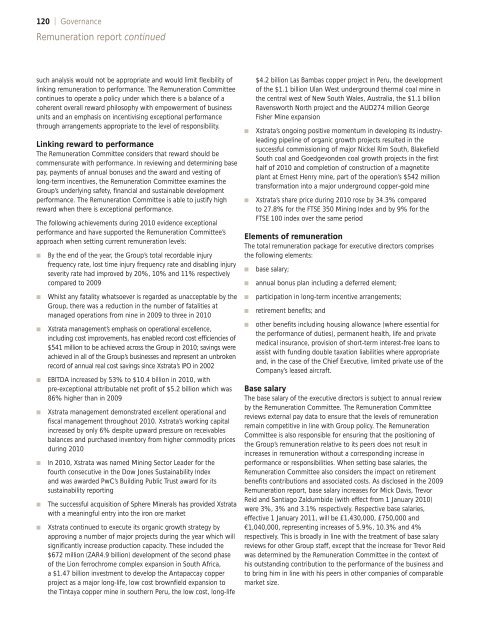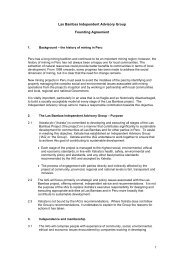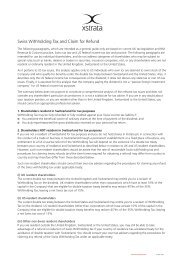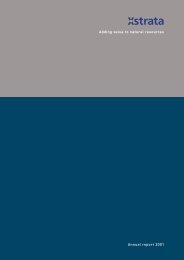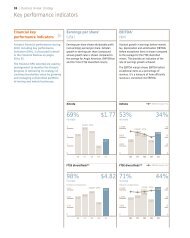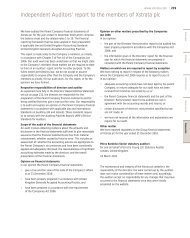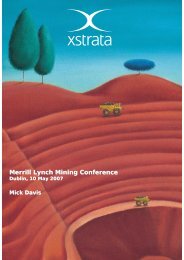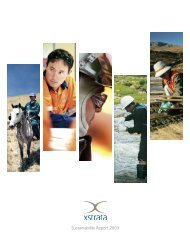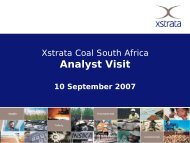Governance - Xstrata
Governance - Xstrata
Governance - Xstrata
You also want an ePaper? Increase the reach of your titles
YUMPU automatically turns print PDFs into web optimized ePapers that Google loves.
120 | <strong>Governance</strong><br />
Remuneration report continued<br />
such analysis would not be appropriate and would limit flexibility of<br />
linking remuneration to performance. The Remuneration Committee<br />
continues to operate a policy under which there is a balance of a<br />
coherent overall reward philosophy with empowerment of business<br />
units and an emphasis on incentivising exceptional performance<br />
through arrangements appropriate to the level of responsibility.<br />
Linking reward to performance<br />
The Remuneration Committee considers that reward should be<br />
commensurate with performance. In reviewing and determining base<br />
pay, payments of annual bonuses and the award and vesting of<br />
long-term incentives, the Remuneration Committee examines the<br />
Group’s underlying safety, financial and sustainable development<br />
performance. The Remuneration Committee is able to justify high<br />
reward when there is exceptional performance.<br />
The following achievements during 2010 evidence exceptional<br />
performance and have supported the Remuneration Committee’s<br />
approach when setting current remuneration levels:<br />
� By the end of the year, the Group’s total recordable injury<br />
frequency rate, lost time injury frequency rate and disabling injury<br />
severity rate had improved by 20%, 10% and 11% respectively<br />
compared to 2009<br />
� Whilst any fatality whatsoever is regarded as unacceptable by the<br />
Group, there was a reduction in the number of fatalities at<br />
managed operations from nine in 2009 to three in 2010<br />
� <strong>Xstrata</strong> management’s emphasis on operational excellence,<br />
including cost improvements, has enabled record cost efficiencies of<br />
$541 million to be achieved across the Group in 2010; savings were<br />
achieved in all of the Group’s businesses and represent an unbroken<br />
record of annual real cost savings since <strong>Xstrata</strong>’s IPO in 2002<br />
� EBITDA increased by 53% to $10.4 billion in 2010, with<br />
pre-exceptional attributable net profit of $5.2 billion which was<br />
86% higher than in 2009<br />
� <strong>Xstrata</strong> management demonstrated excellent operational and<br />
fiscal management throughout 2010. <strong>Xstrata</strong>’s working capital<br />
increased by only 6% despite upward pressure on receivables<br />
balances and purchased inventory from higher commodity prices<br />
during 2010<br />
� In 2010, <strong>Xstrata</strong> was named Mining Sector Leader for the<br />
fourth consecutive in the Dow Jones Sustainability Index<br />
and was awarded PwC’s Building Public Trust award for its<br />
sustainability reporting<br />
� The successful acquisition of Sphere Minerals has provided <strong>Xstrata</strong><br />
with a meaningful entry into the iron ore market<br />
� <strong>Xstrata</strong> continued to execute its organic growth strategy by<br />
approving a number of major projects during the year which will<br />
significantly increase production capacity. These included the<br />
$672 million (ZAR4.9 billion) development of the second phase<br />
of the Lion ferrochrome complex expansion in South Africa,<br />
a $1.47 billion investment to develop the Antapaccay copper<br />
project as a major long-life, low cost brownfield expansion to<br />
the Tintaya copper mine in southern Peru, the low cost, long-life<br />
$4.2 billion Las Bambas copper project in Peru, the development<br />
of the $1.1 billion Ulan West underground thermal coal mine in<br />
the central west of New South Wales, Australia, the $1.1 billion<br />
Ravensworth North project and the AUD274 million George<br />
Fisher Mine expansion<br />
� <strong>Xstrata</strong>’s ongoing positive momentum in developing its industryleading<br />
pipeline of organic growth projects resulted in the<br />
successful commissioning of major Nickel Rim South, Blakefield<br />
South coal and Goedgevonden coal growth projects in the first<br />
half of 2010 and completion of construction of a magnetite<br />
plant at Ernest Henry mine, part of the operation’s $542 million<br />
transformation into a major underground copper-gold mine<br />
� <strong>Xstrata</strong>’s share price during 2010 rose by 34.3% compared<br />
to 27.8% for the FTSE 350 Mining Index and by 9% for the<br />
FTSE 100 index over the same period<br />
Elements of remuneration<br />
The total remuneration package for executive directors comprises<br />
the following elements:<br />
� base salary;<br />
� annual bonus plan including a deferred element;<br />
� participation in long-term incentive arrangements;<br />
� retirement benefits; and<br />
� other benefits including housing allowance (where essential for<br />
the performance of duties), permanent health, life and private<br />
medical insurance, provision of short-term interest-free loans to<br />
assist with funding double taxation liabilities where appropriate<br />
and, in the case of the Chief Executive, limited private use of the<br />
Company’s leased aircraft.<br />
Base salary<br />
The base salary of the executive directors is subject to annual review<br />
by the Remuneration Committee. The Remuneration Committee<br />
reviews external pay data to ensure that the levels of remuneration<br />
remain competitive in line with Group policy. The Remuneration<br />
Committee is also responsible for ensuring that the positioning of<br />
the Group’s remuneration relative to its peers does not result in<br />
increases in remuneration without a corresponding increase in<br />
performance or responsibilities. When setting base salaries, the<br />
Remuneration Committee also considers the impact on retirement<br />
benefits contributions and associated costs. As disclosed in the 2009<br />
Remuneration report, base salary increases for Mick Davis, Trevor<br />
Reid and Santiago Zaldumbide (with effect from 1 January 2010)<br />
were 3%, 3% and 3.1% respectively. Respective base salaries,<br />
effective 1 January 2011, will be £1,430,000, £750,000 and<br />
€1,040,000, representing increases of 5.9%, 10.3% and 4%<br />
respectively. This is broadly in line with the treatment of base salary<br />
reviews for other Group staff, except that the increase for Trevor Reid<br />
was determined by the Remuneration Committee in the context of<br />
his outstanding contribution to the performance of the business and<br />
to bring him in line with his peers in other companies of comparable<br />
market size.


